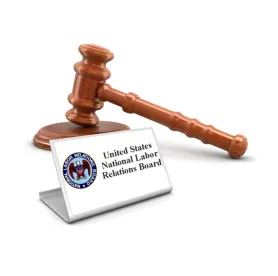On October 10, 2019, the National Labor Relations Board’s (“NLRB” or “Board”) decision in LA Specialty Produce Company provided some employer-friendly clarification of its standard for assessing the lawfulness of employee handbook provisions under the National Labor Relations Act (“NLRA”), and in doing so, categorized two specific types of policies as generally lawful. In this case, the Board analyzed the following two handbook rules maintained by LA Specialty Produce to determine whether the rules improperly impeded or chilled employees’ NLRA rights to engage in protected concerted activity for the purpose of their mutual aid and protection:
-
Confidentiality and Non-Disclosure: “Every employee is responsible for protecting any and all information that is used, acquired or added to regarding matters that are confidential and proprietary of [LA Specialty Produce] including, but not limited to client/vendor lists…”
-
Media Contact: “Employees approached for interview and/or comments by the news media, cannot provide them with any information. Our President … is the only person authorized and designated to comment on Company policies or any event that may affect our organization.”
As you may recall, under the previous presidential administration, when the Board was comprised of a majority of Democrat appointees, common-place, common-sense employer rules such as these were frequently found to violate employees’ rights under the NLRA. However, as you may also recall from our previous post, in 2017, the new Republican-majority Board announced a revised test in The Boeing Company, abandoning the prior Lutheran Heritage Village-Livonia test under which so many policies were deemed by the previous Board to be unlawful. The new “Boeing” test narrowed the types of policies that would be considered to violate the NLRA going forward. In a nutshell, the standard utilized immediately prior to Boeing allowed the Board to find unlawful any policy that “could” be interpreted to interfere or chill Section 7 rights, whether or not that interpretation was reasonable or likely. But under the Boeing test, as the LA Specialty Produce decision explains, the Board “must not presume improper interference with employee rights” and instead now considers (i) the nature and extent of a policy’s or rule’s impact on NLRA rights, and then, (ii) the legitimate employer justifications associated with the rule. The LA Specialty Board also reiterated the following three employee rule categories, guided by United States Supreme Court precedent:
-
rules that, when reasonably interpreted, do not interfere with the exercise of NLRA rights, or the potential adverse impact on protected rights is outweighed by justifications associated with the rule;
-
rules that warrant individualized scrutiny in each case as to whether the rule would prohibit or interfere with NLRA rights, and if so, whether any adverse impact on NLRA-protected conduct is outweighed by legitimate justifications; and
-
rules that are unlawful because they would prohibit or limit NLRA-protected conduct, and the adverse impact on NLRA rights is not outweighed by justifications associated with the rule.
The LA Specialty Board clarified that a determination as to which category a specific rule falls in should be the result of an analysis under the Boeing test, and not part of the test itself, and that, to the extent the Board can categorically place specific types of rules or policies into one of these categories, it will bring significant clarity to employers as they draft their own employee rules.
In applying the Boeing test to the rules in LA Specialty, the Board found that both rules fit into Category 1, and thus did neither violated the NLRA.
With regard to the Confidentiality rule, the initial NLRB complaint alleging that the rule violated the NLRA asserted that the rule prevented employees from exercising their NLRA rights to appeal to their employer’s customers and vendors in an attempt to improve their terms and conditions of employment. However, the Board held that a reasonable reading of the rule does not prevent such communication either by employees or third parties on their behalf, nor does it prevent employees from providing customer or vendor names to third parties, such as their union. Instead, the Board held that the rule narrowly prohibits the disclosure of the Company’s lists of customers and vendors and other, non-public proprietary information. The Board explained its position that rules that prohibit the disclosure of confidential and proprietary customer and vendor lists do not interfere with the exercise of NLRA rights.
With regard to the Media Contact rule, the Board held that although the first sentence could be read to broadly prohibit any employee contact with the media, including a protected NLRA right to report working conditions to the media in an effort to improve them, the second sentence of the rule confines that prohibition to media contact initiated by the media (not the employee) and made on the Company’s behalf. The Board noted that each sentence of a rule should not be interpreted in isolation, and rather, the context of the entire rule must be considered. The Board also categorically defined rules that prohibit employees from speaking on their employer’s behalf as Category 1 rules that do not interfere with NLRA rights because the NLRA does not provide employees with the right to speak on their employer’s behalf.
This decision marks a continuing return to an approach by the Board that better balances an employer’s right to have legitimate policies and rules for its employees that govern important aspects of their employment and company business, with employees’ right to act concertedly to improve terms and conditions of their employment. In addition to confidentiality and media contact policies, the Board’s decision in LA Specialty provides additional guidance under which employers can better evaluate other common employer policies to ensure they do not violate the NLRA.




 />i
/>i
